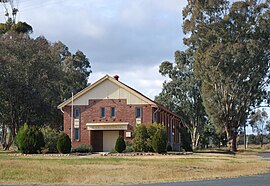Greenethorpe
|
Greenethorpe New South Wales |
|
|---|---|

War memorial hall
|
|
| Coordinates | 33°59′47″S 148°24′09″E / 33.99639°S 148.40250°ECoordinates: 33°59′47″S 148°24′09″E / 33.99639°S 148.40250°E |
| Population | 320 (2011 census) |
| Established | 1908 |
| Postcode(s) | 2809 |
| Location | |
| LGA(s) | Weddin Shire |
| State electorate(s) | Cootamundra |
| Federal Division(s) | Hume |
Greenethorpe is a town in the Central West region of New South Wales, Australia. The town is located in the Weddin Shire local government area, 345 kilometres (214 mi) west of the state capital, Sydney. At the2011 census, Greenethorpe and the surrounding area had a population of 320.
The village, with the associated "Mount Oriel" homestead (known locally as Iandra Castle), is a rare example in Australia of the manorial system, "the likes of which may not exist elsewhere in the state or nation".
Greenethorpe is a purpose-built town, established in 1908 to house sharefarmers who worked on Iandra, the nearby pastoral station owned by George Henry Greene. The village, built adjacent to a rail siding on the Grenfell railway line, was originally named Iandra Siding but to avoid confusion between the pastoral station and the train station, the Post Office agreed to change the name to Greenthorpe. Shortly after, the spelling was again changed, this time to Greenethorpe from the Greene family name. Greenethorpe Public School was first established in 1903 as a Provisional School and named Iandra Siding. The school was renamed in 1909.
Iandra Siding Post Office opened on 20 January 1908 and was renamed Greenethorpe in September that year.
The village itself was based on the English manorial system, with tenant farms—generally 640 acres (260 ha) each—distributed around the central homestead. The sharefarming system began in 1892 and a rail siding constructed in 1903. In the early years of the twentieth century, Iandra set a record for the largest ever yield of wheat from a single property, and by 1911 there were fifty sharefarmers working over 18,000 acres (7,300 ha) there—the farmers supplying the machinery and labour and Greene providing seed and clearing ground suitable for ploughing. Around 1914, the property began to be broken up and most tenants were offered an option to purchase the land they had farmed.
...
Wikipedia

